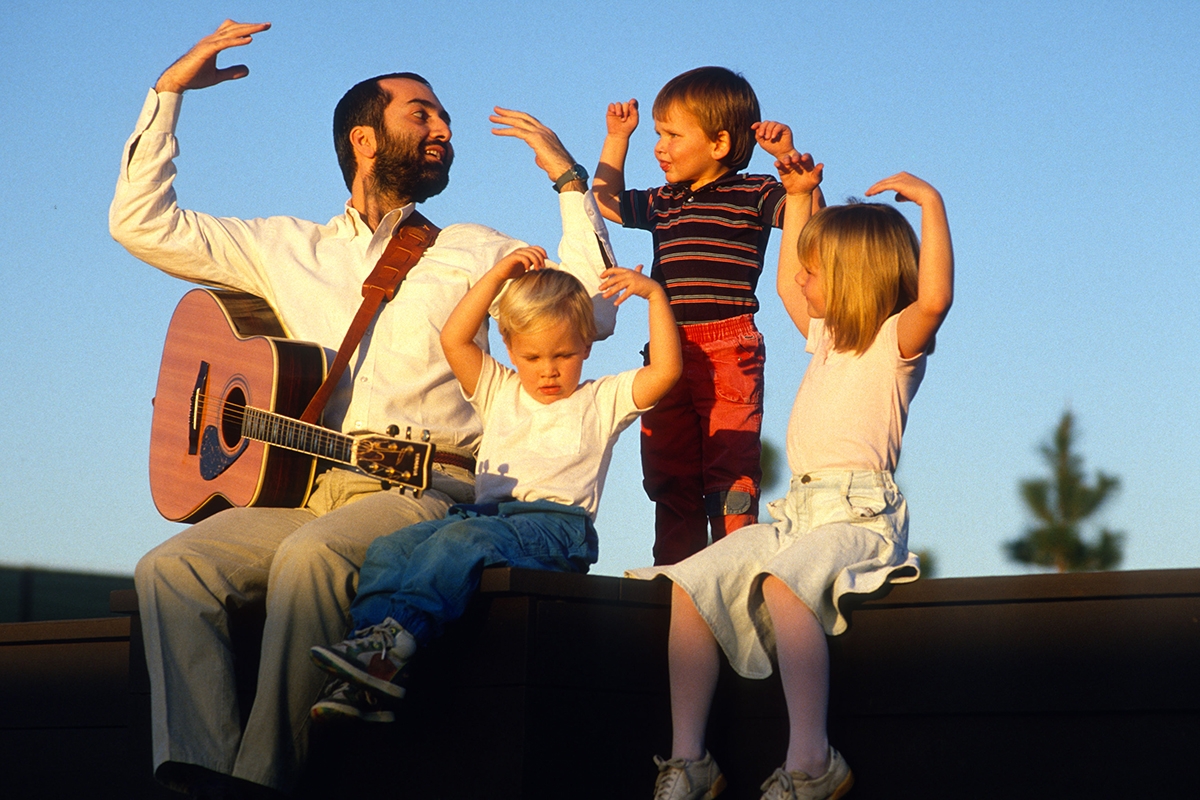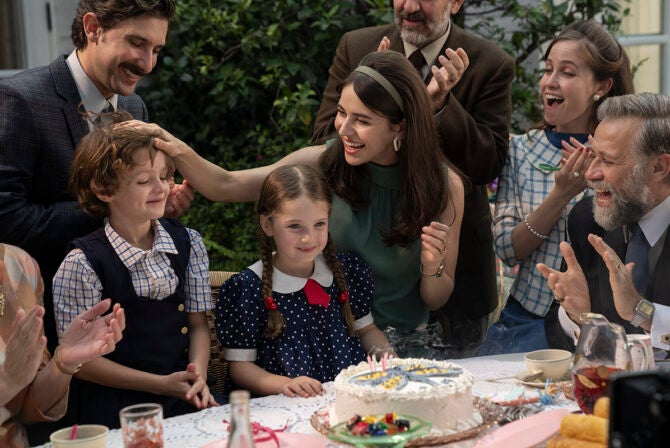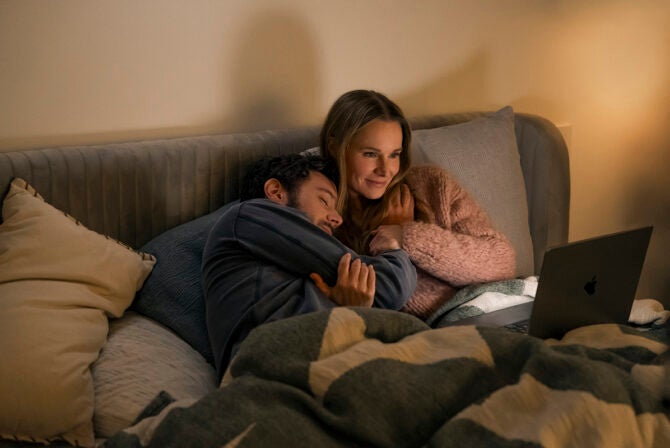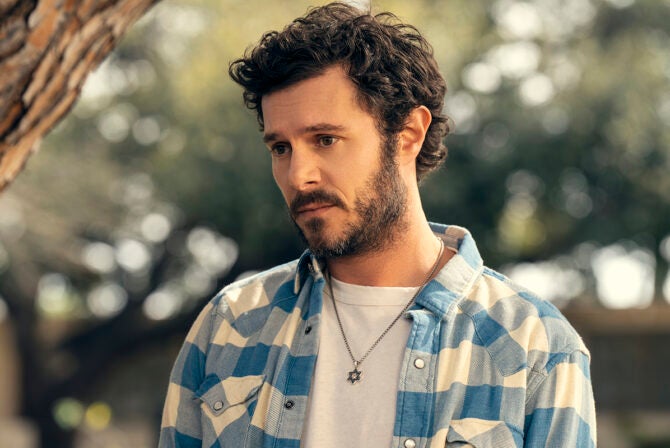I grew up in Israel, which means I didn’t grow up on Raffi’s music. SO I was an adult, a parent, when I discovered the punny magic of “Bananaphone” and the winning sweetness of “Baby Beluga.”
And I was also an adult — a post October 7, 2023 adult — when I discovered his song “Salaam Shalom,” a song about wishes for peace for the “children of Israel” and “children of Palestine” who all “want a place to live” and “a time to shine.” It’s a song full of hope, wishing that time will heal pain and create a bridge between these two people so that they can live side by side.
The song is a perfect Raffi song. In small and big ways, Raffi has long incorporated humanism into his work, in both his lyrics and the way he performs in front of children, and in his charitable actions and activism that focus on a principal which he dubs “child honouring.” The song was included on a 2006 album that centers that spirit, “Resisto Dancing – Songs of Compassionate Revolution.”
In 2004, he performed the song with a choir of both adults and children in British Columbia, accompanied by a dumbeg, or goblet drum (or darbuka, as I grew up calling it) to echo the music heard in the land about which he was singing. Hearing the voices of small children call for peace makes the song even more poignant.
It also reminds me very much of the songs about peace that I grew up on as a child in Israel in the days after the Oslo Accords — from “Salaam” by Mosh Ben-Ari to “Shalom Zo Mila Shimushit” (“Shalom Is a Useful Word”) to the older “Etzlenu Ba’Chatzer” (“In Our Yard”), written in 1979 by Naomi Shemer, which teaches the word hello in different languages through visitors to a backyard summer celebration, and says that the greeting of salaam is the most beautiful greeting of all. It’s a song which is very much reminiscent of Raffi’s own 1985 song “Like You and Me.”
In the days after the October 7 attack, Raffi posted about his care for children affected by the conflict and the innocent civilians killed in both Israel and in Gaza. He mentioned “Salaam Shalom” and “Like You and Me,” but also the lyrics of Leonard Cohen, the idea of tikkun olam and the words of artist Lorraine Schneider, who herself was inspired by her Jewish family’s experience with war and persecution.
But most controversially, he posted an image of a 17th century carpet that had swastikas on it. It was an old Armenian rug, a tribute to the singer’s roots, but it struck a deep chord with Jews, who felt the use of the symbol at a time of rising antisemitism couldn’t have been accidental.
Raffi deleted the post and shared an apology with a still from his 2004 performance of “Salaam Shalom,” writing, “heartfelt apologies for the hurt that I may have unintentionally caused to Jewish friends here. my support has always been and always will be for ALL children, wherever they live.” It was a pretty good internet apology, all things considered. A few weeks later, he shared a sweet photo of him at a friend’s Hanukkah celebration, and then, in a New Year’s post outlining his wishes for 20024, included the release of Israeli hostages, along with a ceasefire, the resignation of Israeli prime minister Benjamin Netanyahu, the flow of aid to Gaza and a path to peace, as well as victory for Ukraine.
Raffi also shared a map of British mandate Palestine from 1947, a year before the state of Israel was formed and what, as he wrote, “Palestinians have referred to as the Nakba,” writing about his fascination with maps and that “history is full of colonial takeovers” — a saying that, to be fair, could have so many meanings in relation to the history of Israel and Palestine.
Raffi was born Raffi Cavoukian not far from Israel, in Egypt, where his parents arrived as Armenian refugees after they left Turkey, fleeing the Armenian genocide. After living in Jerusalem and Syria, the family wound up settling in Canada, where he developed his music skills and fell in love with the music of Bob Dylan. He then found his calling making music for children, calling himself “the children’s troubadour.”
Making and remaking versions of “Down By the Bay” with my children and laughing together, joyfully shaking our sillies out, and practicing gratitude with the “Modeh Ani”-like “Thanks A Lot,” I can’t help but feel grateful for how these songs lighten the burden of caring for little kids. And I’m grateful that Raffi continues to fight for a better and easier world for children everywhere.
“Sister brother, mother father,” Raffi urges in “Salaam Shalom,” “Learn a new dance, sing a new song. Walk a new path, make a circle where we all belong.”
Listening to both this song, and the old peace songs of my youth, while looking at the news today, it’s easy to feel despondent, like the images that they painted so well of a peaceful world are too far beyond our reach. Yet they’re a reminder that those that matter most — our children — still deserve that future.








